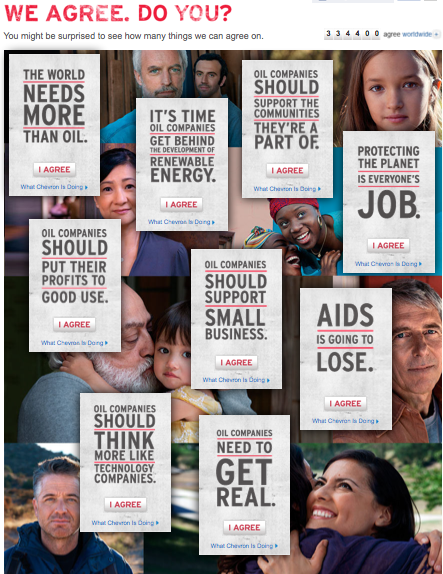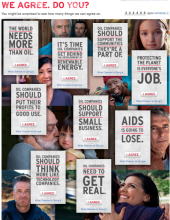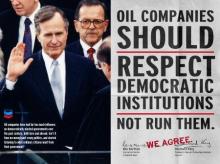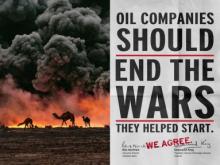Chevron thinks we're stupid
New example
 Chevron is the second largest oil company in the world, and historically has been at the centre of many controversies, from oil spills to dubious investments and tax evasion. In 2010 they fell mercy to a momentous prank.
Chevron is the second largest oil company in the world, and historically has been at the centre of many controversies, from oil spills to dubious investments and tax evasion. In 2010 they fell mercy to a momentous prank.In 2010 Chevron prepared to release a campaign called 'We Agree', which featured messages from ordinary people explaining what they think the oil company should do, such as 'support local schools and communities'. On the website, visitors were invited to click 'I agree' and join the community of concerned consumers, supposedly guiding the oil company's decision-making process.The campaign also had downloadable posters which people could post around their towns.
This type of strategy is widely recognised as flagrant 'greenwashing', aimed at deflecting criticism of the environmental impact of the oil industry.
The Rain Forest Action Network (RAN), Amazon Watch (AW) and the Yes Men set out to undermine Chevron through through a perfectly-timed culture jamming stunt. The activists' campaign began with a press release from a spoof Chevron domain, which launched the fake 'We Agree' site hours before the real Chevron could launch its own, real campaign. The fake 'We Agree' site featured four 'improved' advertisements, complete with downloadable PDF files to be used in on-the-street postering. These featured damning mesages like 'Oil companies should clean up their messes' and 'Oil companies should respect democratic institutions not run them'.
By the time Chevron released their own campaign, the fake campaign had already been published across different media channels. As Chevron attempted to remedy the situation, the activists continued to release more false information, confusing everyone. As The Yes Men write on their blog, "Throughout the day, a sort of slow vaudeville unfolded on the web, as a number of press outlets, from industry mouthpieces to the AFP and even a watchdog group, produced accidental mash-ups of 'real' and fake information."
Read about how it all transpired, at the Yes Lab.
The success of the RAN/AW/Yes Men campaign lay mainly in its timing and its ability to successfully dupe the public and the media. It managed to simultaneously make Chevron look extremely stupid and to present evidence to counter the company’s 'greenwashing'.
FURTHER READING
Chevron's $80 million ad campaign gets flushed, Yes Lab, 2010.


